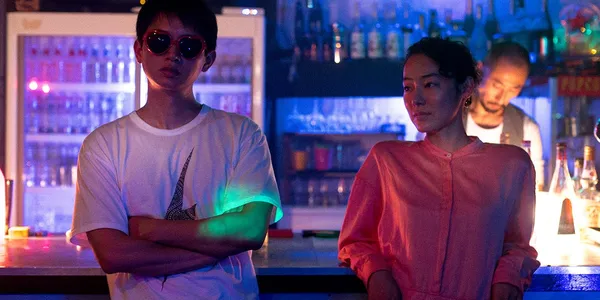Eye For Film >> Movies >> Complicity (2018) Film Review
Complicity
Reviewed by: Jennie Kermode

Worldwide, one in every 30 people is an immigrant. Around one in six of those people has no legal status in the countries where they reside. In Japan, there are an estimated 300,000 illegal immigrants, most of whom have overstayed on visas. Chen-liang's story is typical of those who go there deliberately. Born in a poor part of China and with a family who depend on him, he's in Japan to try to earn money that he can send home. He has no prospect of getting a visa - the assumption would be that he would overstay - but what he can do is spend his savings on a fake ID, giving him the chance to work. Even as an assistant cook in a small rural restaurant, he can make a fortune compared to what he'd get at home, and he's willing to work hard for as many hours as are asked of him in order to make the most of his chance.
To succeed in this new life, Chen-liang must become Liu. it's an immersive experience. Only occasional phone calls connect him with his past life and loved ones, give him the chance to hear his own name. Over time, he begins to lose all sense of himself. This fits remarkably well with the Japanese ideal of what a young chef ought to be, placing himself wholly at the service of his master, devoting himself to studying the culinary art and practising, practising, practising until he perfects his skill. Chen-liang's unwitting boss is enchanted by this and the two form an increasingly intense bond. As the older man talks of making the immigrant youth his successor, the youth, in turn, almost comes to believe in it, despite knowing in his heart of hearts that this is not who he is - that sooner or later the law will come looking for him and the fantasy will end.

With a strong central performance from Yulai Lu and great supporting work from Tatsuya Fuji, the film explores the intersection between the identities people need to perform in life and those they might discover within themselves. Tension is derived from Chen-liang's increasing sense of disorientation, the risk of exposure and the question of what his boss will do should he discover the truth. He, too, is at risk of legal sanctions if he's discovered to be employing an illegal immigrant. Where does complicity begin and end? Does it matter that the youth is so thoroughly assimilated into Japanese culture? Does his skill matter? When is covering for an immigrant about exploitation and when does it become about love?
Delicate and patient in its approach, very traditional in its structure right up until the end, Complicity is rich in poetic representations of Japanese food culture and rural life. This is a context in which internal peace stems from a strong sense of one's place in the world, and the way in which it gently shifts to make room for a stranger makes a quietly optimistic statement about the future.
Reviewed on: 10 Nov 2018
















